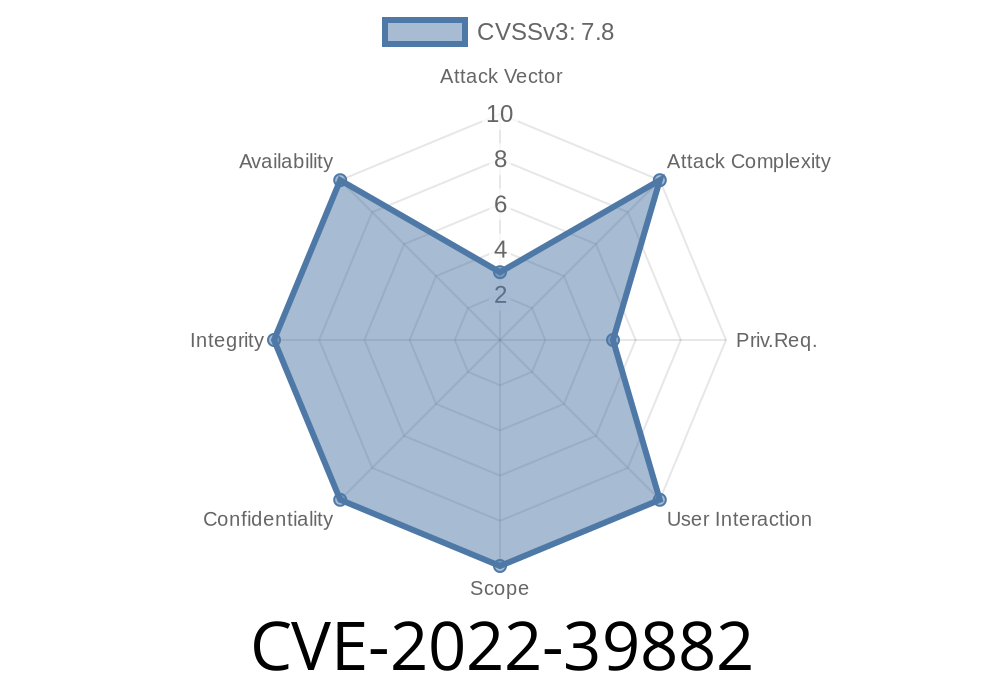CVE-2022-39882 is a serious heap overflow vulnerability discovered in the sflacf_fal_bytes_peek function of the libsmat.so library, impacting versions shipped before the Security Maintenance Release (SMR) of November 2022 Release 1. This issue can allow a local attacker to execute arbitrary code on affected systems, introducing significant security risks, especially for devices and systems relying on this library.
In this deep dive, we'll explain what makes this vulnerability possible, break down how an exploit could work, and share references and discussion to help you understand if you're at risk—and how to stay safe.
Background: What Is libsmat.so?
libsmat.so is a system library used in various products for handling file abstraction and data parsing tasks. Vulnerabilities in core libraries like this can be especially dangerous, as they may impact multiple applications or system services that depend on them.
The vulnerable function looks something like this in C
int sflacf_fal_bytes_peek(void *buffer, int len) {
// ... some prep code ...
memcpy(buffer, src, len); // LEN is not properly sanitized!
// ... some more code ...
return ;
}
What's wrong here?
The memcpy call copies len bytes from src (the data source) into buffer. However, there isn’t a check to ensure that len doesn’t exceed the size of buffer. If an attacker controls len or can make len very big, this will copy more data than buffer can hold. The extra bytes will overflow into the heap, corrupting adjacent data structures.
Why is this dangerous?
Exploitation Steps: High-Level View
1. Obtain Local Access:
Since the attack is local, the attacker needs to run code on the device (e.g., a rogue app, a local user, or a script).
2. Prepare Malicious Input:
The attacker supplies crafted input to a function using sflacf_fal_bytes_peek, making sure len is deliberately larger than the buffer’s actual size.
3. Trigger the Vulnerability:
The oversized memcpy operation overflows heap memory, potentially overwriting pointers or control structures.
4. Gain Code Execution:
By precisely controlling the overflow, it may be possible to overwrite function pointers or heap metadata. Modern heap allocators often have protections, but there are known heap exploitation techniques (like "House of Spirit") that can bypass them in some cases.
Pseudo Exploit (PoC Sketch)
// Assume 'target_func' uses sflacf_fal_bytes_peek internally
#include <stdio.h>
#include <string.h>
int main() {
char data[32]; // Small buffer
memset(data, 'A', sizeof(data));
int len = 80; // Deliberately larger than our buffer
// Here's where the overflow would happen inside the vulnerable func
sflacf_fal_bytes_peek(data, len);
// Normally the program would crash or attacker would hijack control here
return ;
}
*Note: To build a real, working exploit you'd likely need to analyze heap structure, symbols, gadgets, etc.—details vary by platform and version.*
Affected Versions and Patch
Affected:
Any software using libsmat.so prior to SMR Nov-2022 Release 1.
Fixed:
Samsung published a fix with the November 2022 Security Maintenance Release.
> Recommendation:
> Update your device or any third-party software using libsmat.so to the latest version provided by your vendor.
References
- Samsung Security Bulletin: SVE-2022-39882
(Look for "Heap overflow vulnerability in sflacf_fal_bytes_peek")
- CVE Details for CVE-2022-39882
- Common Heap Exploitation Techniques
- MITRE CVE Record
Update Now: Install all security updates for your device or applications using libsmat.so.
- App Auditing: If you're developing or distributing apps using this library, redeploy with a patched version.
- Limit Local Attack Surface: Be selective about what apps or scripts you run, especially from untrusted sources.
Conclusion
Heap overflows like CVE-2022-39882 remain a significant threat, especially when hiding in shared libraries. Their impact is often broad, exploiting a single point to compromise many programs. Stay vigilant, patch often, and always scrutinize memory operations in your code!
*If you want more technical details, feel free to contact your vendor’s security team or follow relevant mailing lists for latest incident and patch updates.*
Timeline
Published on: 11/09/2022 22:15:00 UTC
Last modified on: 11/10/2022 15:17:00 UTC
